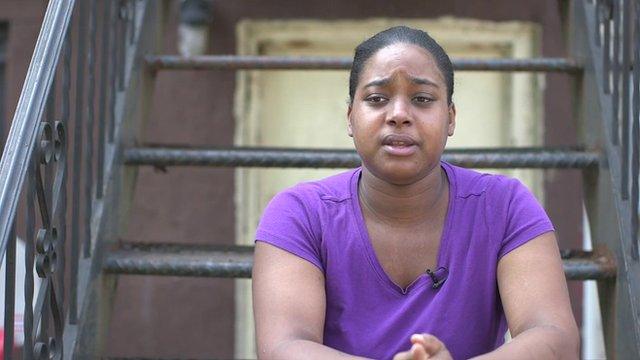Eric Garner death: US orders civil rights inquiry
- Published
Crowds gathered in New York to protest against the grand jury's decision
The US justice department is to launch a civil rights investigation into the death of Eric Garner, a black man who was placed in an apparent chokehold by a white New York police officer.
The inquiry was announced by Attorney General Eric Holder after a grand jury decided against charging the officer.
That decision prompted street protests in New York. Activists have called for a march in Washington next week.
President Barack Obama said the case spoke to "larger issues".
Mr Garner, 43, was stopped on a street in New York on 17 July on suspicion of selling loose, untaxed cigarettes.
After a confrontation with police he was wrestled to the ground and restrained by force. He became unresponsive and later died.
America saw a wave of race-related unrest only last week over the decision not to indict another white police officer who had shot dead a young black man in Ferguson, Missouri.
Announcing, external "an independent, thorough, fair and expeditious" investigation into potential civil rights violations in the chokehold case, Mr Holder said he was continuing a review of how to heal a "breakdown in trust" between police and communities.
The justice department, he said, would conduct a "complete review" of material gathered in the local investigation. "All lives must be valued - all lives," he added.

Nick Bryant, BBC News, New York
Footage of the arrest sparked national outrage - Nick Bryant reports
In isolation, the decision of the grand jury in Staten Island not to indict the white NYPD officer Daniel Pantaleo would have sparked anger.
The fact that it came less than 10 days after a grand jury in Missouri decided that the white officer involved in the shooting of Michael Brown should not face criminal charges has amplified the sense of racial injustice felt by those who believe the decision is inexplicable.
In contrast to Ferguson, there is video evidence showing what happened in Staten Island. New York's medical examiner had already ruled that the death of Eric Garner was a homicide, and that the chokehold contributed to it.
Even though America has a black president and a black attorney general, Eric Holder, this will reinforce the widespread feeling in poor African-American communities that the criminal justice system is weighted against them, and that the law is not colour-blind.

'I can't breathe'
The confrontation between Eric Garner and police officer Daniel Pantaleo was captured on a mobile phone, external.
The footage shows Mr Pantaleo and other officers arresting him after a lengthy exchange during which he verbally refuses to be handcuffed.
Several officers move to restrain Mr Garner, with Mr Pantaleo holding him by the neck. The detainee, who is asthmatic, can be heard shouting repeatedly, "I can't breathe!".
City officials found Mr Garner's death was caused by "the compression of his chest and prone positioning during physical restraint by police".
Asthma and heart disease also contributed to his death, they said.
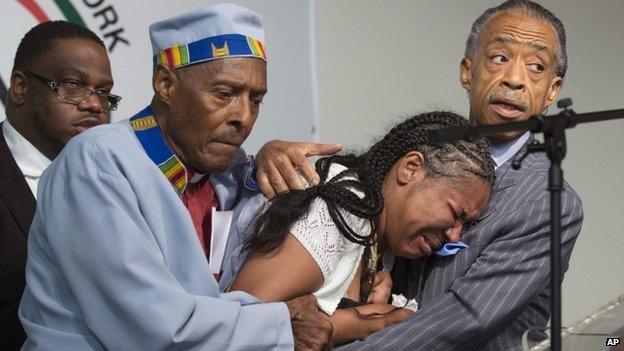
Esaw Garner, wife of Eric Garner, broke down into the arms of activist Al Sharpton
When the grand jury decided not to bring charges against Mr Pantaleo, the announcement perplexed legal experts.
Ekow Yankah, a professor at Cardozo School of Law, told the Associated Press it was "hard to understand" how the jury failed to see probable cause of a crime.
James Cohen of Fordham University Law School added: "Logic doesn't play a role in this process."
On the streets protesters marched through New York and other cities in the US late on Wednesday, occasionally disrupting traffic, chanting "I can't breathe!" and "Hands up - don't choke!"
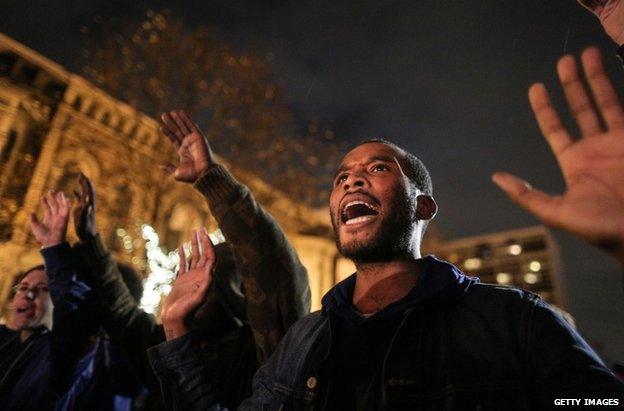
Solidarity protests were held in Oakland, California
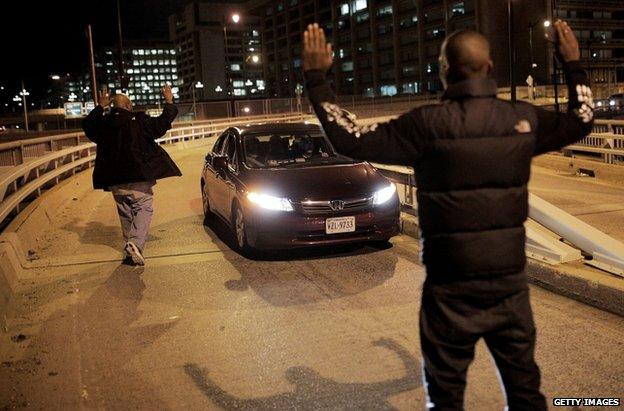
In Washington DC, protesters blocked traffic on Highway I-395
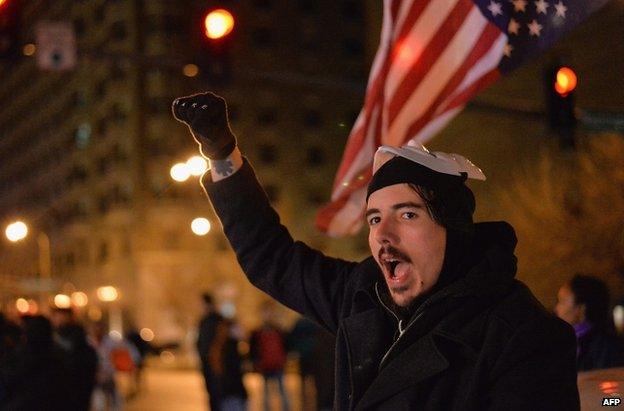
Demonstrators also turned out in St Louis, Missouri

What is a grand jury?
In the US, a grand jury of ordinary citizens who represent the community is often used to decide whether there is enough evidence to pursue a prosecution
Usually the only lawyer present in grand jury hearings is the prosecutor, who will present evidence
Grand jury proceedings are conducted behind closed doors to encourage witnesses to speak freely and to protect the defendant's reputation in case the jury does not indict
Even though a grand jury may decide not to indict, a prosecutor could still bring the defendant to trial if they think they have a strong enough case


The grand jury decision sparked protest in New York and other cities
After the grand jury decision President Obama said: "When anybody in this country is not being treated equally under the law, that is a problem, and it's my job as president to help solve it."
New York Mayor Bill de Blasio called the outcome, external "one that many in our city did not want" and appealed for a "peaceful, constructive" response.
'Most cruel thing'
Garner family lawyer Jonathon Moore said he was "astonished" by it, and Eric Garner's widow, Esaw Garner, said her husband's death would "not be in vain".
Mr Garner's mother Gwen Carr and widow Esaw Garner appealed for peaceful protests in the wake of the grand jury's decision
"I'm determined to get justice for my husband, because he shouldn't have been killed in that way," she said.
Mr Garner's daughter, Erica Snipes, told the BBC she was outraged: "On that video you can see the most cruel horrible thing that someone could do to someone. It's just not right."
Erica Snipes talks about the loss of her father
Civil rights activists Al Sharpton called for a march in Washington on 13 December, saying that state prosecutors worked "hand in hand with the local police".
Mr Pantaleo issued a statement in which he said it had never been his "intention to harm anyone" and that he was praying for Garner and his family.
Mr Pantaleo's lawyer argued he had used a move taught by the police department, not a chokehold which is banned under New York Police Department policy.
Since Mr Garner's death, officers at the largest police department in the US have been ordered to undergo retraining on restraint.
- Published3 December 2014
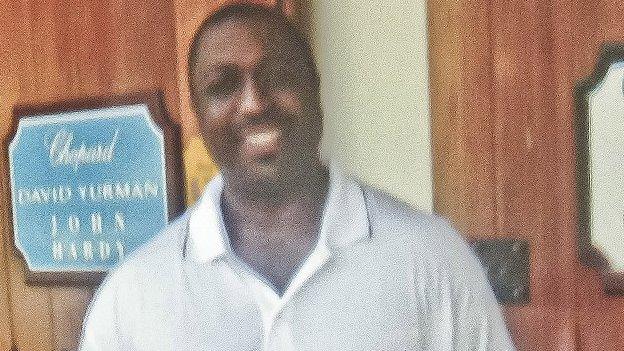
- Published4 December 2014
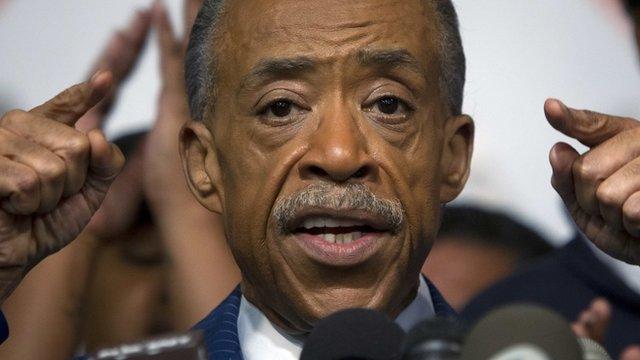
- Published4 December 2014
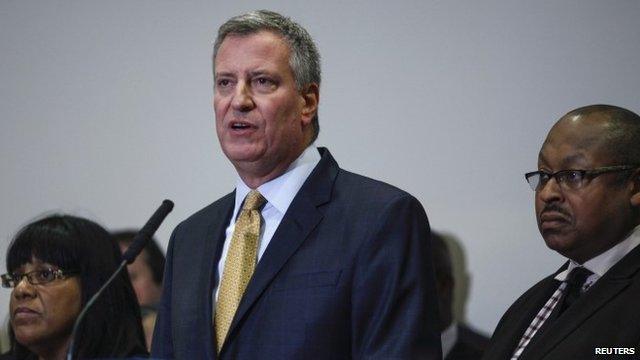
- Published3 December 2014
